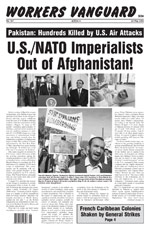
On the IG and the EFCA (Letter) Toronto Dear Workers Vanguard, Our polemic, “The IG and National Association of Manufacturers Oppose the EFCA” (WV No. 935, 24 April), repeats a factual error by the Internationalist Group concerning the legality of card checks for union organizing in Canada. The bosses have long opposed card-check systems like that in the proposed Employee Free Choice Act—which allow certification of newly organized unions when a majority of workers sign union cards, as opposed to mandatory elections after a waiting period—precisely because they make it easier to organize unions. The IG blithely dismisses all this and claims, “Canada has a card check law and only 17 percent of the private sector workforce is unionized (as opposed to 7.5 percent in the U.S.).” We rightly note, “It takes some chutzpah to sneer at ‘only’ more than doubling union membership!” But the truth is even more damning to the IG. Under Canadian labour law, which is largely provincially regulated, half the provinces including three of the four most populous do not have card-check laws. Those that do have them generally have higher—sometimes much higher—rates of unionization. The clearest contrast is between Ontario and Quebec, the two largest and most industrialized provinces. Ontario’s former card-check law was eliminated by a right-wing government in the mid 1990s; since then its unionization rate has declined to 28 percent (about 17 percent in the private sector). In Quebec, where there is still a card-check law, the equivalent rates are 40 percent overall and 27 percent in the private sector. Of course, the existence of card checks is hardly the only factor here—as WV correctly notes, “The success or failure of any unionization campaign will ultimately be determined by class struggle.” But the reality is that Quebec has a rate of unionization nearly four times that of the United States. Not unrelatedly, it is the only place in either Canada or the U.S. where there has been a successful campaign to organize the notoriously anti-labour Wal-Mart. Comradely,
|
|
|||||||||||||||||||||||||||||||||||||||||||||||||||
